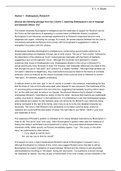S. V. H. Boyes
Section 1 - Shakespeare, Richard III
Discuss the following passage from Act 3 Scene 7, exploring Shakespeare’s use of language
and dramatic effects. [15]
This extract illustrates Buckingham’s intelligence and the weakness of support for Richard’s bid for
the throne as the importance of appealing to a power-base of influential citizens is explored.
Buckingham’s tone becomes increasingly apprehensive as Richard’s responses become more
desperate and urgent, indicating his outrage. As a result, the power balance between the two men is
momentarily subverted as Richard must comply with his kingmaker’s suggestions in order to
strengthen his position with the citizens.
Shakespeare illustrates Buckingham’s intelligence by constructing several subtle references to
familial relationships and bastardy through use of word choice. The use of “holy mother” followed by
the description of the citizens as “mum” subconsciously resonates with the theme of bastardy,
suggesting a pun on the adjective “mum”, although this would be more pertinent to modern
audiences than those of Shakespeare’s era. Shakespeare alludes to the rumour of Edward IV’s
sexual promiscuity more obviously in lines 7-9; however, less noticeable references are made to this
trait through the use of “laid open” and “untouch’d, or slightly handled”. Although these phrases are
not used in reference to illegitimacy, they could subconsciously be linked to the theme of unchaste
behaviour which is hinted at by the choice of phrases which could be used in reference to women -
“laid open”, for example, suggests undressing.
A metrical stress on the verb “got” in line 10 results in a break in the sentence, emphasising the fact
that the Duke of York and his wife were apart when Edward IV was conceived. The harshness of the
‘T’ sound is jarring compared to the rest of the line, suggesting that bastardy is jarring within nature
too, as the child was seen to harbour sin. Equally, the physical distance that is alluded to further
emphasises Edward’s “resemblance, being not like the duke”, because their features are supposedly
unalike, thus there is ‘distance’ in their genetics too. It is interesting to note that Shakespeare grasps
upon features as a reason to infer bastardy when one accounts for Richard’s own deformity being
striking compared to the rest of his family, even more so as he is the only disabled character we
encounter. The irony is that Richard’s only semblance to his father could be facial, unlike his
nephews who could fulfil the description of being “the right idea of your father, / Both in your form
and nobleness of mind”.
The weakness of Richard’s position is indicated by him being dictated instructions by Buckingham in
lines 45-48. The use of “look” and “play” within Buckingham’s speech make clear the intentions of
fooling the citizens via Richard’s accomplishment in acting. The power balance between the two
characters shifts, rather quickly, as Richard immediately agrees: “I go”. This could, on the other
hand, be undermined by what follows:
“...if you plead as well for them
As I can say nay to thee for myself”.
This speech is ironic in that it foreshadows Richard’s denial of Buckingham’s request in Act 4,
although Buckingham is unaware of this, which may suggest Richard never intended to deliver
Buckingham his reward. Imbalance of power between Richard and the citizens is also physically
demonstrated by his being on “the leads” during the next scene - his superiority is shown through
his closeness to Heaven; the irony at play is that Richard is the most morally corrupt character in the





